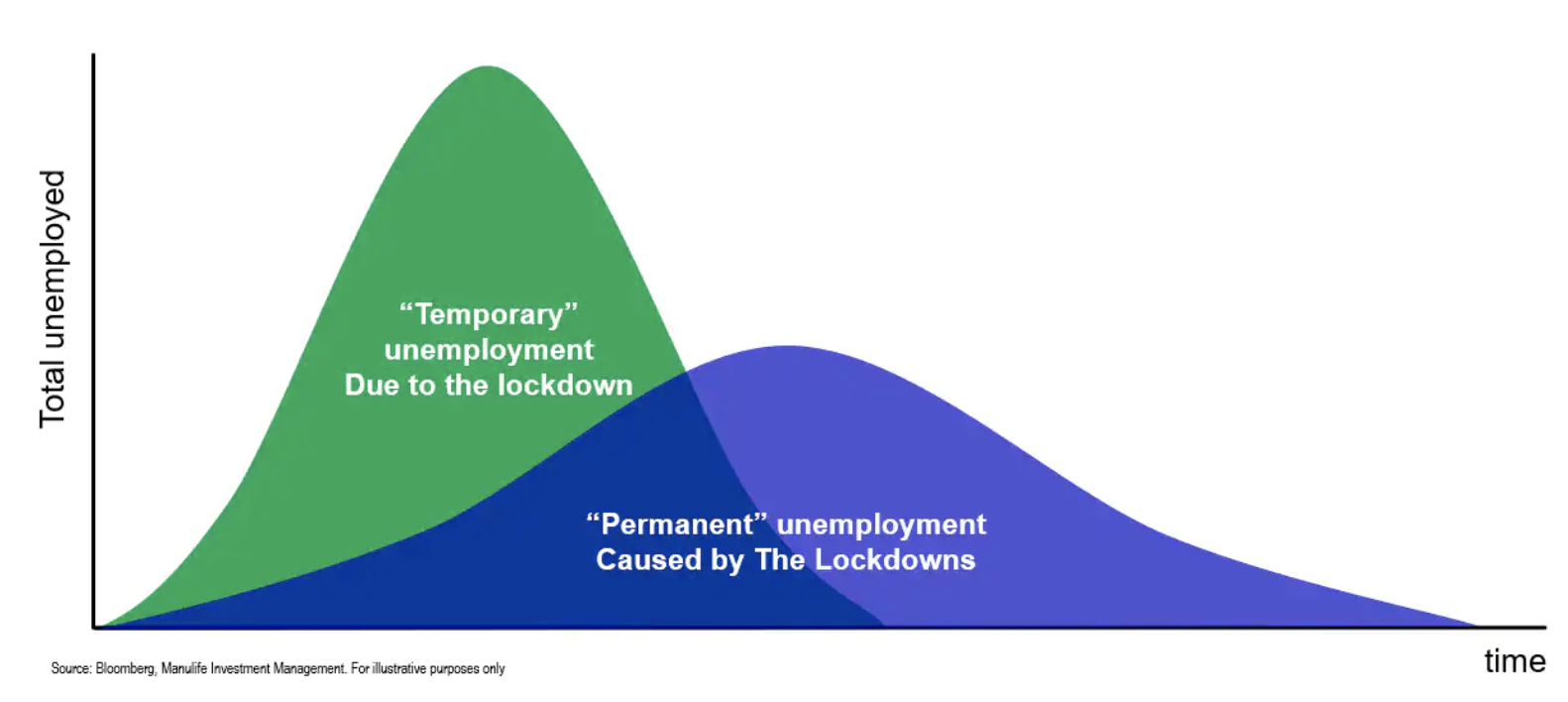Unemployment is more important than you think [Market Commentary]
Last week, the Bureau of Labor Statistics (BLS) report on unemployment drew general attention, in particular the data showing that the official unemployment rate (U-3) has slowed down to 8,3% compared to the estimated level of 9,8, XNUMX%. Many commentators have interpreted this huge monthly decline as an undeniable signal that the US labor market is recovering much faster than forecast. In fact, the situation is quite different. Detailed analysis of the data reveals the first signs of the devastating effects of unemployment, which put into question the quality of the national economy. The period of unemployment is growing rapidly: in August, the percentage of people who were unemployed for more than 15 weeks reached 60%. On the other hand, the number of people who permanently lost their jobs increased to 3. compared with 400 thous. at the beginning of the year. Given that the flu season is starting and there is a risk of a new wave of Covid-1, we can expect further restrictions in the coming weeks or months, with the result that the number of people who have permanently lost their jobs will increase even more.
About the Author
 Christopher Dembik - French economist of Polish origin. Is a global head of macroeconomic research at a Danish investment bank Saxo Bank (a subsidiary of the Chinese company Geely serving 860 HNW customers around the world). He is also an advisor to French parliamentarians and a member of the Polish think tank CASE, which took first place in the economic think tank in Central and Eastern Europe according to a report Global Go to Think Tank Index. As a global head of macroeconomic research, he supports branches, providing analysis of global monetary policy and macroeconomic developments to institutional and HNW clients in Europe and MENA. He is a regular commentator in international media (CNBC, Reuters, FT, BFM TV, France 2, etc.) and a speaker at international events (COP22, MENA Investment Congress, Paris Global Conference, etc.).
Christopher Dembik - French economist of Polish origin. Is a global head of macroeconomic research at a Danish investment bank Saxo Bank (a subsidiary of the Chinese company Geely serving 860 HNW customers around the world). He is also an advisor to French parliamentarians and a member of the Polish think tank CASE, which took first place in the economic think tank in Central and Eastern Europe according to a report Global Go to Think Tank Index. As a global head of macroeconomic research, he supports branches, providing analysis of global monetary policy and macroeconomic developments to institutional and HNW clients in Europe and MENA. He is a regular commentator in international media (CNBC, Reuters, FT, BFM TV, France 2, etc.) and a speaker at international events (COP22, MENA Investment Congress, Paris Global Conference, etc.).
The chart below, published on Bloomberg, clearly shows how high the rate is currently in the context of the labor market. The temporary unemployment rate plunged rapidly after the lockdown was lifted, but persistent unemployment, which is likely to increase due to business failures in the short to medium term, may place a heavy burden on the economy over a very long period.

The immediate risk to the US economy is the possibility that large sections of the population, often including the youngest and the least qualified (retail, hospitality, etc.), will turn into mass unemployment, further emphasizing an already existing severe problem of inequality. .
The crisis can contribute to the implementation of sustained incentives for automation and this new wave of automation, at an unspecified pace, could hit the skill mix this time around, including amongst highly skilled workers.
One of the obvious consequences of the pandemic is that it will accelerate change in the corporate sector. In the 90s, the market was polarized by the computerization of enterprises. Workers had the choice of mastering new skills or working in low-skilled jobs in the service sector. Covid-19 is currently a threat to this group, but no one is sure what will happen to white-collar workers. The crisis can contribute to the implementation of sustained incentives for automation and this new wave of automation, at an unspecified pace, could hit the skill mix this time around, including amongst highly skilled workers. Automation can therefore keep unemployment much higher than during the previous crisis; perhaps even for decades, if governments fail to resolve the issue.
In fact, in such unusual circumstances, governments - in the United States, but also everywhere else - are faced with an almost unsolvable problem. The first solution, willingly used by most governments, was to extend the Temporary Suspension Scheme as necessary (in the United States, in particular through special unemployment benefits due to the pandemic) to prevent a large proportion of the working population from becoming unemployed. she would fall into poverty. This, however, represents a significant cost to the economy. As the chief economist rightly noted Bank of EnglandAndy Haldane:
"Keeping all these jobs under the drip to some extent postpones the inevitable in a way that may not save either the worker or the company."
We are slowly falling into the trap of the zombie economy that will result in a decline in productivity and potential growth in the years to come. The second option is to focus on job creation in emerging sectors (such as the green or circular economy) instead of protecting jobs at all costs. However, even with the best possible vocational training policy, history and experience show that it is rare that the destruction of existing low-skilled and newly automated jobs as a result of a restructuring of the economy results in the creation of at least the same number of high-quality and protected jobs. In other words, an undefined part of the population will remain permanently or almost permanently outside the labor market, mainly due to insufficient competences, requiring constant support from the state. This confirms the need for a serious rethink of the policy hitherto considered utopian, such as unconditional basic income.






















![Forex Club – Tax 9 – Settle tax on a foreign broker [Download the Application] Forex Club - Tax 9](https://forexclub.pl/wp-content/uploads/2024/02/Forex-Club-Podatek-9-184x120.jpg?v=1709046278)
![Trading View platform – solutions tailored to the needs of traders [Review] trading view review](https://forexclub.pl/wp-content/uploads/2024/03/trading-view-recenzja-184x120.jpg?v=1709558918)
![How to connect your FP Markets account to the Trading View platform [Guide] fp markets trading view](https://forexclub.pl/wp-content/uploads/2024/02/fp-markets-trading-view-184x120.jpg?v=1708677291)
![How to invest in ChatGPT and AI? Stocks and ETFs [Guide] how to invest in chatgpt and artificial intelligence](https://forexclub.pl/wp-content/uploads/2023/02/jak-inwestowac-w-chatgpt-i-sztuczna-inteligencje-184x120.jpg?v=1676364263)


![WeWork – the anatomy of the collapse of a company valued at $47 billion [WeWork, part II] wework bankruptcy story](https://forexclub.pl/wp-content/uploads/2024/04/wework-bankructwo-historia-184x120.jpg?v=1711729561)
![Adam Neumann – the man who screwed up Softbank [WeWork, part AND] adam neumann wework](https://forexclub.pl/wp-content/uploads/2024/04/adam-neumann-wework-184x120.jpg?v=1711728724)





![How to transfer shares to another brokerage office [Procedure description] how to transfer shares to another brokerage house](https://forexclub.pl/wp-content/uploads/2024/03/jak-przeniesc-akcje-do-innego-biura-maklerskiego-184x120.jpg?v=1709556924)

![The most common mistakes of a beginner trader - Mr Yogi [VIDEO] Scalping - The most common mistakes of a beginner trader - VIDEO](https://forexclub.pl/wp-content/uploads/2024/03/Scalping-Najczestsze-bledy-poczatkujacego-tradera-VIDEO-184x120.jpg?v=1711601376)
![Learning patience: No position is also a position - Mr Yogi [VIDEO] Scalping - Learning patience - No position is also a position - VIDEO](https://forexclub.pl/wp-content/uploads/2024/03/Scalping-Nauka-cierpliwosci-Brak-pozycji-to-tez-pozycja-VIDEO-184x120.jpg?v=1710999249)
![When to exit a position and how to minimize losses - Mr Yogi [VIDEO] Scalping - When to exit a position and how to minimize losses - VIDEO](https://forexclub.pl/wp-content/uploads/2024/03/Scalping-Kiedy-wyjsc-z-pozycji-i-jak-minimalizowac-straty-VIDEO-184x120.jpg?v=1710336731)



![Unemployment is more important than you think [Market Commentary] unemployment](https://forexclub.pl/wp-content/uploads/2020/09/bezrobocie.jpg?v=1599652803)


![Unemployment is more important than you think [Market Commentary] forex turnover](https://forexclub.pl/wp-content/uploads/2020/09/obroty-forex-102x65.jpg?v=1599641523)
![Unemployment is more important than you think [Market Commentary] boris johnson brexit usa accord](https://forexclub.pl/wp-content/uploads/2020/09/boris-johnson-brexit-porozumienie-usa-102x65.jpg?v=1599734792)









